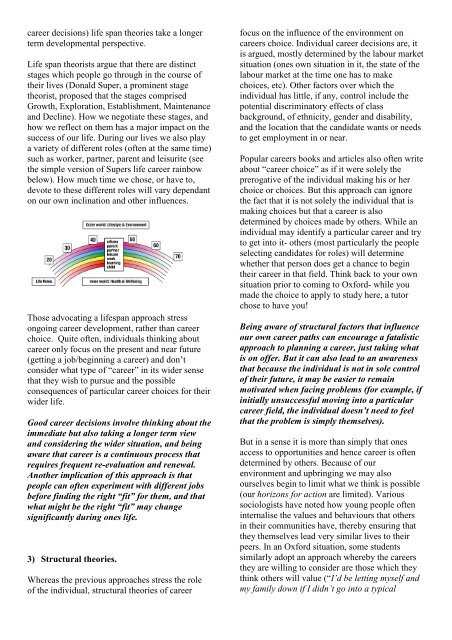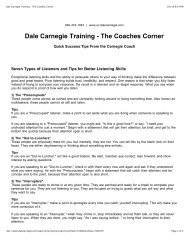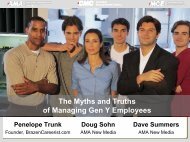How do people choose and build careers? - Writersblok1.org
How do people choose and build careers? - Writersblok1.org
How do people choose and build careers? - Writersblok1.org
Create successful ePaper yourself
Turn your PDF publications into a flip-book with our unique Google optimized e-Paper software.
career decisions) life span theories take a longer<br />
term developmental perspective.<br />
Life span theorists argue that there are distinct<br />
stages which <strong>people</strong> go through in the course of<br />
their lives (Donald Super, a prominent stage<br />
theorist, proposed that the stages comprised<br />
Growth, Exploration, Establishment, Maintenance<br />
<strong>and</strong> Decline). <strong>How</strong> we negotiate these stages, <strong>and</strong><br />
how we reflect on them has a major impact on the<br />
success of our life. During our lives we also play<br />
a variety of different roles (often at the same time)<br />
such as worker, partner, parent <strong>and</strong> leisurite (see<br />
the simple version of Supers life career rainbow<br />
below). <strong>How</strong> much time we chose, or have to,<br />
devote to these different roles will vary dependant<br />
on our own inclination <strong>and</strong> other influences.<br />
Those advocating a lifespan approach stress<br />
ongoing career development, rather than career<br />
choice. Quite often, individuals thinking about<br />
career only focus on the present <strong>and</strong> near future<br />
(getting a job/beginning a career) <strong>and</strong> <strong>do</strong>n’t<br />
consider what type of “career” in its wider sense<br />
that they wish to pursue <strong>and</strong> the possible<br />
consequences of particular career choices for their<br />
wider life.<br />
Good career decisions involve thinking about the<br />
immediate but also taking a longer term view<br />
<strong>and</strong> considering the wider situation, <strong>and</strong> being<br />
aware that career is a continuous process that<br />
requires frequent re-evaluation <strong>and</strong> renewal.<br />
Another implication of this approach is that<br />
<strong>people</strong> can often experiment with different jobs<br />
before finding the right “fit” for them, <strong>and</strong> that<br />
what might be the right “fit” may change<br />
significantly during ones life.<br />
3) Structural theories.<br />
Whereas the previous approaches stress the role<br />
of the individual, structural theories of career<br />
focus on the influence of the environment on<br />
<strong>careers</strong> choice. Individual career decisions are, it<br />
is argued, mostly determined by the labour market<br />
situation (ones own situation in it, the state of the<br />
labour market at the time one has to make<br />
choices, etc). Other factors over which the<br />
individual has little, if any, control include the<br />
potential discriminatory effects of class<br />
background, of ethnicity, gender <strong>and</strong> disability,<br />
<strong>and</strong> the location that the c<strong>and</strong>idate wants or needs<br />
to get employment in or near.<br />
Popular <strong>careers</strong> books <strong>and</strong> articles also often write<br />
about “career choice” as if it were solely the<br />
prerogative of the individual making his or her<br />
choice or choices. But this approach can ignore<br />
the fact that it is not solely the individual that is<br />
making choices but that a career is also<br />
determined by choices made by others. While an<br />
individual may identify a particular career <strong>and</strong> try<br />
to get into it- others (most particularly the <strong>people</strong><br />
selecting c<strong>and</strong>idates for roles) will determine<br />
whether that person <strong>do</strong>es get a chance to begin<br />
their career in that field. Think back to your own<br />
situation prior to coming to Oxford- while you<br />
made the choice to apply to study here, a tutor<br />
chose to have you!<br />
Being aware of structural factors that influence<br />
our own career paths can encourage a fatalistic<br />
approach to planning a career, just taking what<br />
is on offer. But it can also lead to an awareness<br />
that because the individual is not in sole control<br />
of their future, it may be easier to remain<br />
motivated when facing problems (for example, if<br />
initially unsuccessful moving into a particular<br />
career field, the individual <strong>do</strong>esn’t need to feel<br />
that the problem is simply themselves).<br />
But in a sense it is more than simply that ones<br />
access to opportunities <strong>and</strong> hence career is often<br />
determined by others. Because of our<br />
environment <strong>and</strong> upbringing we may also<br />
ourselves begin to limit what we think is possible<br />
(our horizons for action are limited). Various<br />
sociologists have noted how young <strong>people</strong> often<br />
internalise the values <strong>and</strong> behaviours that others<br />
in their communities have, thereby ensuring that<br />
they themselves lead very similar lives to their<br />
peers. In an Oxford situation, some students<br />
similarly a<strong>do</strong>pt an approach whereby the <strong>careers</strong><br />
they are willing to consider are those which they<br />
think others will value (“I’d be letting myself <strong>and</strong><br />
my family <strong>do</strong>wn if I didn’t go into a typical






